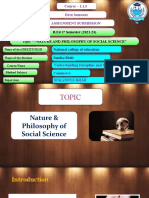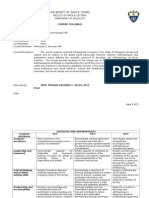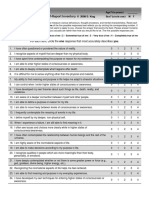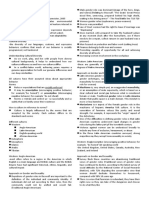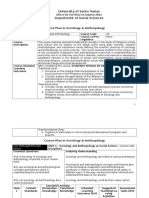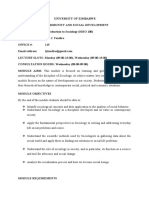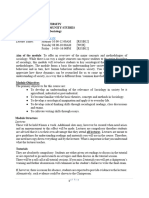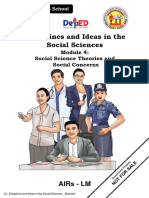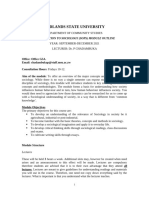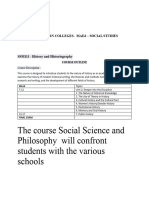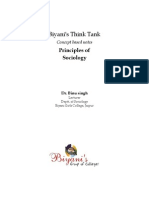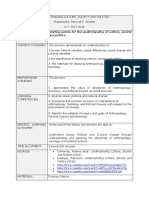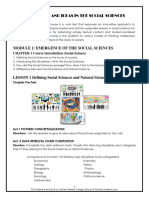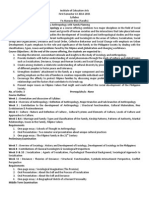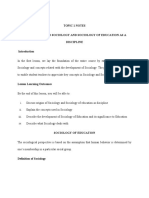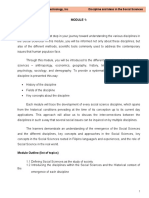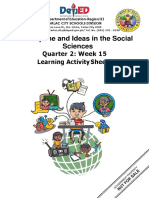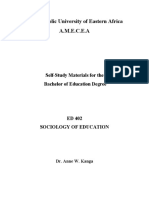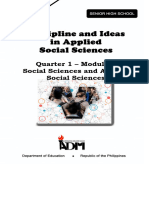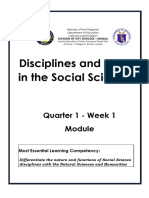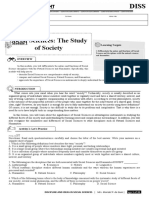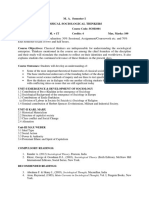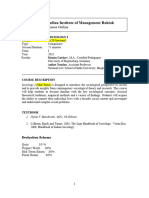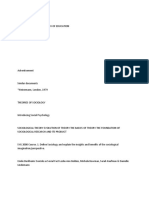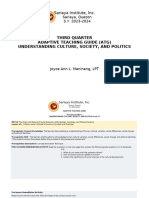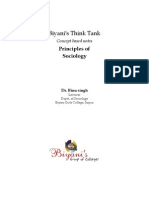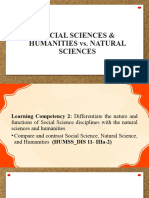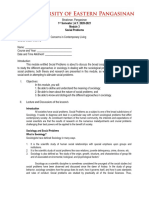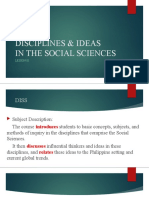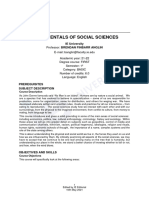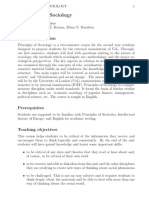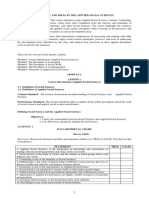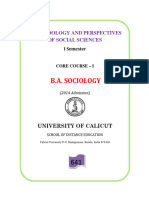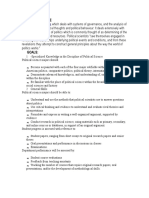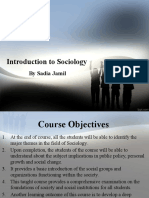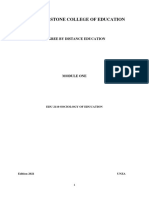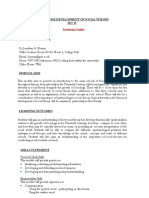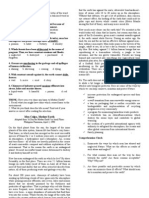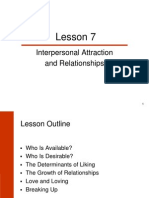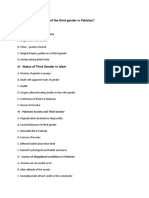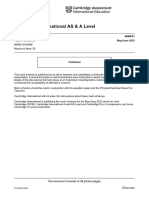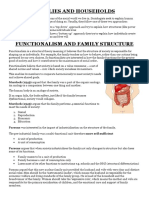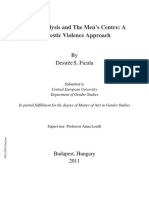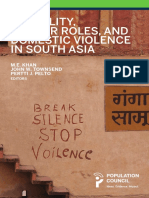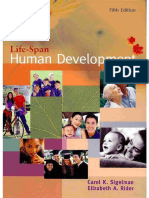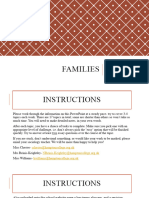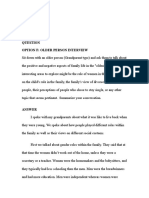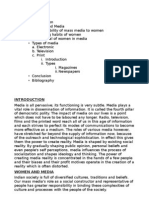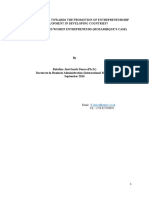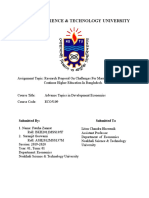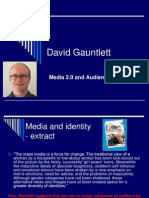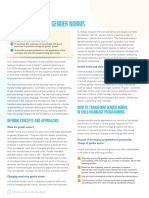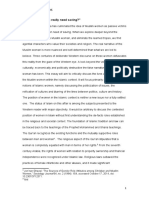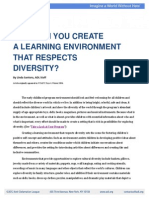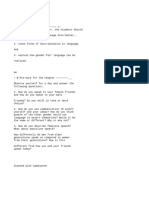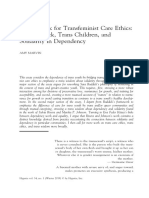Sociology and Anthropology Generic Course Syllabi II Sem 12-13-1
Sociology and Anthropology Generic Course Syllabi II Sem 12-13-1
Uploaded by
Zeth KiyoskeCopyright:
Available Formats
Sociology and Anthropology Generic Course Syllabi II Sem 12-13-1
Sociology and Anthropology Generic Course Syllabi II Sem 12-13-1
Uploaded by
Zeth KiyoskeOriginal Description:
Original Title
Copyright
Available Formats
Share this document
Did you find this document useful?
Is this content inappropriate?
Copyright:
Available Formats
Sociology and Anthropology Generic Course Syllabi II Sem 12-13-1
Sociology and Anthropology Generic Course Syllabi II Sem 12-13-1
Uploaded by
Zeth KiyoskeCopyright:
Available Formats
ATENEO DE MANILA UNIVERSITY
Loyola Schools
Generic Course Syllabus for 2
nd
Semester, School Year 2012-2013
Department Sociology and Anthropology School Social Sciences
Course No. SA 100
Course Title Basic Statistics for the Social Sciences
No. of Units 3
Course Description:
The course presents the basic concepts and operations of social statistics. It focuses on
single variable and two-variable analysis, and introduces the workings of multi-variable
operations. Application made to issues in health, life, and the social sciences.
Course Objective/s:
The course objectives are three:
1. To enable students to grasp the basic concepts and operations of statistics.
2. To enable students to apply, using SPSS, appropriate statistical methods to
summarize and analyze data in the health sciences, life sciences, and the social
sciences.
3. To enable students to interpret and present results of statistical operations.
Course Outline:
This course emphasizes an understanding of basic statistical concepts, and their
application to health, life and social science situations. Students will learn how to use
SPSS for Windows, statistics software, and will also be given, or will create, their own
data sets that will be used for exercises, exams, and class presentations. A statistical
report constitutes the final requirement of the course. Students are expected to
participate actively in class and be prepared for collaborative work with classmates.
References (optional):
Denis Anthony. Statistics for Health, Life and Social Science. An e-book prepared by
Venus Publishing, 2011.
ATENEO DE MANILA UNIVERSITY
Loyola Schools
Generic Course Syllabus for 2
nd
Semester, School Year 2012-2013
Department Sociology and Anthropology School Social Sciences
Course No. SA 101
Course Title Survey of Social Theories
No. of Units 3
Course Description:
The course introduces students to sociological ways of understanding the dialectic
between self and society. Focus will be on the disciplines major paradigms and their
concepts, their applications in interpreting social phenomena, methodological issues,
and the value of sociological perspectives in understanding Philippine society and
cultureincluding ones location in society.
Course Objective/s:
The objectives of the course are as follows: 1) To make students grasp the essential
features of the sociological imagination. 2) To appreciate the major sociological
paradigms or perspectives that enrich the sociological discourse. 3) To understand how
these paradigms are used in studies of social phenomena. 4) To apply a sociological
perspective when looking at everyday life, particularly Filipino social life. [c/o Prof.
Ricky Abad]
Course Outline:
1. Foundational Sociological Perspective
Understanding the problematic of sociology. The sociological
imagination
Teleological views of society vs. synthetic views of contemporary reality.
George Herbert Spencer and the organic analogists. Georg Simmel and
the sociological commentary on modernity
Karl Marx and historical-dialectical materialism. Class, power and
conflict
Emile Durkheim on solidarity and the notion of social facts. Elementary
Forms of Religious Life.
Max Weber on action, ideal types and understanding
2. Sociological Perspectives in Transition
The twentieth century reaction to conflict: structural functionalism:
Talcott Parsons and Robert Merton
The problematic of structure and agency
The turn to the individual: framing and symbolic interactionism. George
Herbert Mead and Herbert Blumer
Epistemological considerations: the sociology of knowledge (Eviatar
Zerubavel). The post-modern critique (Lewis Mumford)
3. Concrete Sociological Issues
The social construction of deviance: sociological perceptions of human
difference (Patricia and Peter Adler)
The sociology of culture: a strong program of cultural sociology (Herbert
Gans and Jeffrey Alexander)
The sociology of economic life: economic activity as embedded in social
relations (Mark Granovetter)
The sociology of religion: secularization (Peter Berger) and multiple
modernities (S.N. Eisenstadt).
The sociology of social and political movements (Doug McAdam).
Sociology in the Philippine setting (Randy David and John Carroll, SJ)
ATENEO DE MANILA UNIVERSITY
Loyola Schools
Generic Course Syllabus for 2
nd
Semester, School Year 2012-2013
Department Sociology and Anthropology School Social Sciences
Course No. SA 105
Course Title Practicum I (Guided Research)
No. of Units 3
Course Description:
SA 105 is an application course that engages the student in the process of knowledge
production. This process involves the preparation of a research proposal, going on a
fieldwork, taking part in validation procedures (e.g., class presentations), and writing of
a research report. Research projects can utilize either quantitative or qualitative
approaches, or a mixture of both.
Course Objective/s:
The course will guide students in assembling a set of concepts and methodologies of
anthropology and sociology that will be useful in collecting and analyzing empirical
evidence of a social phenomenon.
Course Outline:
Overview of the Research Process
Research Proposal Development
Presentation of Research Proposals
Data Gathering and Analysis
Data Analysis and Report Writing
Research Report Submission and Presentation
ATENEO DE MANILA UNIVERSITY
Loyola Schools
Generic Course Syllabus for 2
nd
Semester, School Year 2012-2013
Department Sociology and Anthropology School Social Sciences
Course No.
SA 107
Course Title
Modern Sociological and Anthropological Thought (THEORIES OF
SOCIETY: FROM MODERN TO POSTMODERN)
No. of Units 3
Course Description:
The watchword is Being Modern. Everyone wants to be Modern, for fear of being
regarded as backward and old-fashioned. But Modernism itself is under question by
a counter-movement called Postmodernism. What therefore does being Modern mean?
When and how did Modernism begin? Why is it increasingly being questioned today?
How credible an alternative is Postmodernism? The question should also be asked: Is the
Philippines Pre-Modern, Modern or Postmdern?
Another theme of the course is tracing the development of different social theories that
have appeared in the West from the Age of Enlightenment to the present. By so doing,
we understand better the genesis of Modernity, its strengths and its vulnerabilities.
Course Objective/s:
At the end of the semester, the student should be able to do the following:
1. Define key features of a theoretical school, with emphasis on the following:
! Its concept of society
! Those aspects of society that the school examines
! The method it uses in examining society.
2. Articulate a school's notion of science.
3. Compare schools in terms of their similarities and differences.
Evaluate strengths and weaknesses of a particular school from your perspective
Course Outline:
The topics covered are the following:
1. An overview of Western history from the Renaissance to World War I. This
familiarity is needed because this history is the context vis--vis which the
various theories were conceived. However, we cannot assume that all are
familiar with this history.
2. Historical roots of the social sciences. The Pioneers: Spencer, Tylor, Morgan
3. French Structuralism: Durkheim and Mauss: Society Shapes the Individual
4. British Functionalism: Everything Has a Purpose
5. Marx: All That Is Solid Melts Into the Air
6. Marxist Schools: Who Is the True Heir?
7. Weber: The Material and the Mental Both Matter
8. American Historicalism: Valuing a Cultures Singularity
9. Phenomenology: The World as Lived By the Ego
10. Symbolic Interactionism: Life Is But a Theater
11. American Functionalism: Talcott Parsons: Between the Objective and the
Subjective
12. Ecological Approaches: Respecting Our Linkages with Nature
13. Levi-Strauss: Social Structure Begins in the Mind
14. Bourdieu: The Value of Symbolic Capital
15. Giddens: Re-Examining Modernity
16. General Systems: Social Process as Feedbacks
17. Post-Modernism: The Re-enchantment of the World
References (optional):
It is better that this be optional because changes are made at the start of each semester.
ATENEO DE MANILA UNIVERSITY
Loyola Schools
Generic Course Syllabus for 2
nd
Semester, School Year 2012-2013
Department Sociology and Anthropology School Social Sciences
Course No. SA 126
Course Title Social Inequality
No. of Units 3
Course Description:
Throughout human history, inequalities of political power, social privilege, and
economic advantage have been almost universal features of societies, although the
degrees of inequality have varied greatly. It has usually been the case that some group
or groups have controlled and exploited other groups. For sociology, the issue of
inequality is a central one because unequal relationships organize society and because
every aspect of our lives is affected by it.
This course views inequality as a matter of patterned structures of unequal
groups and not as something which is randomly distributed between individuals. The
course looks at inequalities between groups with regard to wealth, social status, gender,
race/ethnicity, and between nation-states.
Course Objective/s:
The long standing concern with social inequality in academic circles and in the local and
global community has strengthened the affirmation that social equality is a fundamental
issue in every society. The focus of this course is to enable students to have a grasp of
the concepts, theories and discourses that stimulate this concern in order to better
analyze and understand the issues and how social inequality affects every aspect of our
lives.
Course Outline:
Course Schedule and Required Readings
Week
1 Social Inequality: Scope of the Course
2 Class and Status 1: Classical Theories
D Harvey, Introduction to Capital (read only)
K Marx, On Class and M Weber, On Class and Status (report)
3 Class and Status 2: Historical Configurations
G Therborn, What Does the Ruling Class Do when It Rules?
4 Class and Status 3: Contemporary Configurations
R Jenkins, Capitalist Development in the NICs
5 Class and Class Consciousness
J Collins, Nicaragua is a SchoolImaginePeasants Victory
6 Gender Divisions
A Oakley, Sex and Gender
7 Gender and Sexuality
D Richardson, Sexuality and Male Dominance
8 Gender and Work
M Mackintosh, Gender and Economics
9 Race and Ethnicity I
Rex, Theories of Race Relations and
Wallman, Ethnicity and the Boundary Process
10 Race and Ethnicity II
D Birch, et all, Ethnicity
P Kramer, Jim Crow Sciencein Occupied Philippines
11 Intersections: Class, Gender and Race
N Klein, Patriarchy Gets Funky
12 Development : A Historical Perspective
I Wallerstein, Development: Lodestar or Illusion
13 Development, Inequality, and Globalization
L Sklair, Capitalism and Development in Global Perspective
14 Global Inequality and Poverty: the Contemporary Picture
D Mazumdar, Poverty in Asia: An Overview
15 Cultural Imperialism
M Dhaouadi, Capitalism, Global Humane Development and the Other
Underdevelopment
16 State, Community and Social Inequality
B Barber, IntroductionJihad and McWorldSecuring Global Democracy
17 Subordination, Resistance and Revolution
D Harvey, What is Going to be Done? And Who is Going to Do It?
ATENEO DE MANILA UNIVERSITY
Loyola Schools
Generic Course Syllabus for 2
nd
Semester, School Year 2012-2013
Department Sociology and Anthropology School Social Sciences
Course No. SA 128
Course Title Cities and Society (Globalizing City)
No. of Units 3
Course Description/Objectives
Sociological Questions/Foci : How do social groups (e.g., gender/ethnic groups, income
classes, urban poor communities) understand and construct their life and work in cities?
How do these constructions differ from those of institutionally located actors like
government officials, policy-makers and civil society groups? How do they relate to
markets and socio-political institutions (e.g., workplaces, schools, local governments)?
What factors shape the life-chances of these groups?
What socio-economic and political factors shape the patterns of social relations in cities? In
like manner, how do these factors shape cities growth and decline? In an increasingly
globalized world, what makes a city competitive? What factors urban structures/processes
in a globalizing landscape? In what ways the local interface with the global?
This course will tackle the above issues/questions. It is designed to acquaint the students
with the concepts, theories, and methods used in analyzing/understanding issues and
problems related to urban development and social life in cities. To achieve the above
learning goals, a combination of conceptual (readings, papers) and practical (reflection and
field-based) exercises will be given in this class.
Course Outline:
Course Requirements/Percentage of Your Grade: Exercises (33.3 percent); Midterm exams
(33.3 percent), final paper (33.3 percent)
Tentative Schedule:
Session 1 : (Nov. 8) Course Overview and requirements
Introductory Lecture: (1) Theoretical Perspectives in Urban Development (2) Focus on
sociological frameworks/perspective on urban analysis: social ecology, political economy.
For Sessions 1-10: Spates and Macionis or Hawley on Urban Sociology; Logan and
Molotch; David Satterthwaite, The Urban Challenge Revisited in Environment 49, no. 9,
6-16, 2007; Gilbert and Gugler; Philippine Sociological Review special urban issue (1998)
Exercise 1: Your socio-biography and your city. Write a 1-2 page(s) about how living in
your particular city has shaped your life (e.g., your studying in Ateneo, your planned
career, etc.)
Exercise 2: Look at UN/Phil. Census data and chart the urbanization levels of cities (first
world vs. third world cities, Philippine cities vs. Metro Manila). Consult: state of world
population 2007: Unleashing the Potential of Urban Growth; The Urban Sprawl: Bahay Kubo Country
No more (electronic copy sent to e-group).
Exercise 4. Make a social-environmental map of Barnagay, Loyola Heights, Q.C.
Session 2 (November 15): Theoretical Perspectives (Contd.)
Continue working on the theoretical frameworks used in studying cities and urban
processes.
Sessions 3-5 (November 22/29)
Readings: Mental Maps; Kevin Lynch, The Image of the City
Exercise 2: Make a conceptual map of your city.
December 8: Exercise on Social Mapping in Loyola Heights
Due: Concept Paper for your individual project
Sessions 6-7 (Dec 6/13): Urban-Rural Interface and Migration; Social Organization in the
City
Sessions 8-9 (Dec. 20/Jan10): Urban Labor Market and Basic Services; Urban Governance:
Political Integration and Conflict
Sessions 10-11 (Jan 17/24): The Global City/The Informational City
Sessions 12-13 (Jan 31/Feb. 7): The Global-Local Interface
Exercise: Walk-Thru/Social-Ecological Mapping of a Sub-City or of
portions of Metro Manila (e.g., Eastwood, Ortigas, Makati, Manila,
Quiapo, Chinatown)
Feb. 16- Examinations for the seniors
Sessions 14-16 (Feb 14/21): Exams/Presentation of Final Papers
March 9: Deadline--submission of final papers
Key Issues/Questions
The social structure and economy of cities: Basic concepts in urban development
What makes an urban settlement a city?
Why do some cities grow faster than others do?
What factors cause urban areas to decline?
How has globalization been influencing the process of urban development?
Theories on residential and firm location; models of urban structure
What important factors influence households choice of residential location?
What important factors influence firms choice for business location?
What do urban economic models say about how different land-uses are configured in the
built environment?
Urban growth and decline
How do urban areas grow? How can urban development be explained by the interplay
between the movement of people and jobs/ firms?
What factors cause cities to degenerate?
What does the urban-life-cycle theory say about the life, death, and probable
resurrection of urban areas?
Planning urban development
Why is it necessary for the public sector to intervene in urban development, especially in
the provision of certain public/ collective goods and services?
Why plan? What are the different tools used to regulate land-use and direct urban
development?
Given climate change, how do we integrate spatial-ecological and green economy-
technologies into urban planning and development?
Urbanization trends in developing Asia
What are the general urbanization trends in developing countries?
What economic factors contribute to massive rural-to-urban migration?
What are the most pressing problems brought about by such processes?
City Competitiveness
How has globalization influenced urban development, especially in developing
countries?
How is global competition manifested in the development and governance of urban
areas?
What factors make cities competitive?
Texts/References: (Reserve Section, Rizal Library) rizal.lib.admu.edu.ph/,
www.csiss.org/classics/content/62 (urban classics)
***Pick any text on urban sociology.
Douglass, Michael. Globalization, Intercity Competition, and the Rise of Civil Society in Pacific Asia:
Toward Livable Cities in the 21
st
Century. Paper presented in "Southeast Asia urban Futures", Center for
Advanced Studies, National University of Singapore, July 21-22, 2000.
Castells, Manuel, The Rise of the Network Society (1997); The Informational City (2004).
Gilbert, Alan and Josef Gugler. Cities, Poverty and Development. Oxford University Press.
1992.
Gugler, Josef (ed.). Cities in the Developing World: Issues, Theory and Policy. Oxford University Press.
1997.
Cities of the Future: Managing Social Transformations. International Social Science
Journal.1996.
Hawley, Amos. Urban Society: An Ecological Approach. Wiley Press. 1981
Henri Lefebvre's The Production of Space; 1994 The Critique of Everyday Life; Social
Justice and the City (1995).
Logan, John and Harvey Molotch. Urban Fortunes: The Political Economy of Place.
University of California Press. 1987.
McGee, Terry, Reconstructing the Southeast Asian City. Paper presented in the "Southeast
Asia Futures", Center for Advanced Studies, National University of Singapore, July 21-22,
2000.
Mckay, Deidre, Reading remittance landscapes: Female migration and agricultural
transition in the Philippines, Geografisk Tidsskrift, Danish Journal of Geography 105(1):89-99, 2005
Porio, Emma. Vulnerability, Adaptation and Resilience to Floods and Climate Change
Related Effects Among Marginal, Riverine Communities in Metro Manila, Asian
Journal of Social Sciences, Jan. 2012.
Porio, Emma. Shifting Spaces of Power in Metro Manila in City:Analysis of Urban Trends,
March 2009.
Porio, Emma. Urban Transition, Poverty and Development in the Philippines, paper
presented in UNFPA-IIED Meetings on Urbanization, London, Sept. 9-10, 2009 (available
in the net).
Porio, Emma. Urban Governance in Southeast Asia: Trends and Prospects. Center for
Social Policy and Public Affairs. 1997.
Porio, Emma. The Community Mortgage Program: An Innovative Social Housing
Programme in the Philippines and Its Outcomes in Empowering Squatter Citizen: Local
Government, Civil Society and Urban Poverty reduction. London: Earthscan Publications,
2004.
Porio, Emma (w/ Christine Crisol). Property Rights, security of tenure and the urban poor
in Metro Manila in Habitat International. Netherlands: Elsevier Publications. 2004.
Indigenous Urbanism: Class, City and Society in Southeast Asia in Journal of Southeast
Asian Studies 26(1): 30-45.
David Satterthwaite, The Urban Challenge Revisited in Environment 49, no. 9, 6-16, 2007
Short and Kim, Globalization and the City, London: Addelman, 1999.
Gavin Shatkin,The city and the bottom line: urban megaprojects and the
privatization of planning in Southeast Asia (electronic copy)
Reed, Robert R. City of Pines : the origins of Baguio as a colonial hill station and
regional capital. Baguio City : A-Seven Pub., 1999.
Reed, Robert R. Colonial Manila : the context of Hispanic urbanism and process of
morphogenesis. Berkeley : University of California Press,
1978.
Spates, James and J. Macionis, The Sociology of Cities. Belmont, California: Wadsworth
Publishing. 1997.
Stren, Richard and J. Bell, Perspectives on the City. Centre for Urban and Community
Studies, University of Toronto. 1995.
Yeu-man Yeung (ed.), Urban Development in Asia: Retrospect and Prospect. Hongkong
Institute of Asia-Pacific Studies. The Chinese University of Hongkong. 1998.
General Publications (electronic copy): The Global Frontier (UNFPA), State of the
Worlds Population 2007(UNFPA), Shatkins study on Metro Manilas by-pass implant
urbanism, Asian Urbanization (ADB); Managing Asian Cities (ADB), The Urban
Sprawl, Bahay Kubo Country No more (UNFPA).
Class Projects/Exercises:
1. Comparison of urban growth and urbanization of Philippine and SEA/World cities
2. Social-Ecological Mapping of Barangay Loyola with special focus on
environmental hot spots which can intensify effects of climate change (e.g.,
floods, intense monsoon rains, typhoons and their unusual patterns)*
3. Walk-Thru/Social-Ecological Mapping* of Sub-Cities in Metro Manila (Eastwood,
Ortigas Center, Global City, Cubao) In what ways, can we find the global in the
local?
4. Community-Based Hazard Mapping and Planning
*Walk-thru and social mapping: Focus on-- Urban Forms, Uses, Lifestyles; Conceptual
and empirical indicators of social differentiation, homogeneity, and change
Community-Based Hazard Mapping and Planning: Focus on identifying risks and
vulnerabilities to floods and other climate change-related risks among urban poor
communities and how this can be used in their planning and rehabilitation efforts.
ATENEO DE MANILA UNIVERSITY
Loyola Schools
Generic Course Syllabus for 2
nd
Semester, School Year 2012-2013
Department Sociology and Anthropology School Social Sciences
Course No. SA 129
Course Title Gender Relations
No. of Units 3
Course Description:
Sex is a biological category while gender is a social one. Sex refers to male and female;
gender to the socially constructed roles of masculine and feminine. Gender relations
refers to the relations between women and men which derive from the social situation.
The focus of the course is the historically specific forms that relations between
women and men take in a given society, especially the politics embedded in these
relations. The discussion includes such topics as sex and gender, gender identity, gender
ideology, sexuality, the erotic environment, the traffic in women, sexual offenses, an
historical analysis of womens subordination, the family-household system and the
economy, and gender, the state, and the church.
Course Objective/s:
The concern with gender relations in academic circles and in the local and global
community has strengthened the affirmation that equality in the status of men and
women is fundamental to every society. The focus of this course is to enable students to
have a grasp of the concepts, theories and discourses that stimulate this concern in order
to better analyze and understand gender issues and properly integrate gender interests in
their future lives and work.
Course Outline:
Course Schedule and Required Readings
Week
1 Gender Relations: Scope of the Course
2 Sex and Gender
A Oakley, Sex and Gender (p)
3 Gender as Social Structure
RW Connell, The Structure of Gender Relations
in Connell, Gender and Power
4 Gender Identity and Gender Roles
GL Fox, Nice Girls asValue Construct
5 Sexuality as Social Construction
D Richardson, Sexuality and Male Dominance (p)
6 Gender Ideology
Student Project: Me, Myself and...
7 Femininity, Masculinity and the Body
M Fabros, et al, From Sanas to Dapat, Negotiating Entitlement(p)
8 Pornography and Prostitution
R Coward, Sexual Violence and Sexuality (p)
9 Sexual Violence
M Maynard, Violence Towards Women (p)
10 The Sexual Division of Labor
M Mackintosh, Gender and Economics(p)
11 The Subordination of Women: Search for Origins
C Deere, Class and Historical Analysis (p)
**12 Intersections/ Gender, Class, and Race
V Stolcke, Naturalization of Social Inequality ...(p)
G Chang, Globalization in Living Color
13 Gender and Development
N Kabeer, Connecting, Extending, Reversing: Development from a Gender
Perspective
14 Gender, Marriage, Family, Love, Sex
O Harris, Households as Natural Units (p)
15 Gender, the State and the Church
K Young, Not the Church, Not the State(p)
16 Gender and Globalization
H Eisenstein, Globalization and Womens Labor (p)
17 Gender and Equality
J Mitchell, Women and Equality (p)
18 Prospects for Gender Relations
RW Connell, The Present and Future(p)
ATENEO DE MANILA UNIVERSITY
Loyola Schools
Generic Course Syllabus for 2
nd
Semester, School Year 2012-2013
Department Sociology and Anthropology School Social Sciences
Course No. SA 130
Course Title Religion, Culture and Society
No. of Units 3
Course Description:
The course offers an in-depth examination of the interface between religion and society,
with a premium placed on cases within the Philippine context. Conceptions of religion
from the classical social thinkersDurkheim, Marx and Weberare first considered.
Contemporary theorizing on the basic presuppositions and ultimate import of religion as
a social realityrational choice and secularizationare also covered. The social and
cultural underpinnings of other religious phenomena, e.g. folk religiosity, cults and
millenarian movements, religious fundamentalism, will also be discussed, along with the
problematic of church-state relations.
Course Objective/s:
By the end of the course the student is expected to have a framework for analyzing
religions from a sociological-anthropological perspective, i.e. from a vantage point other
than that of faith or theology. The student is also expected to develop a facility for
identifying research problems in the field of religion and investigating them empirically.
Course Outline:
1. Introduction, Class Policies, Varia. Introduction to Sociology and Anthropology
as a Social Science disciplines (class1); the religious context of the development
of Sociology-Anthropology (class 2)
2. The societal and cultural underpinnings of religion. Typologies of churches,
sects and cults.
3. Classical theories of religion: the Marxian perspectives. Materialist analyses of
religion
4. Classical theories of religion: the Durkheimian perspectives. Contemporary
applications of Durkheim. Focus on the functionalist perspective.
5. Classical theories of religion: the Weberian perspective.
6. Introduction to the secularization debate (class 2)
7. Secularization theory: its rise, critique, and adaptations
8. Rational choice theories of religious adherence.
9. Applications of rational choice theory. Introduction to cults, and millenarian
movements.
10. The Rizalistas and Lapiang Malaya. Reynaldo Ileto on Philippine millenarian
movements.
11. Folk religiosity. Acculturation and syncretism
12. The challenges of contemporary religious fundamentalism. Focus on Islam.
13. Church and state relations. Jose Casanova and the notion of public religions
14. Church and state issues in the Philippines. Philippine debates on the
Reproduction Health Bill (c/o guest speaker Fr. Eric Genilo, SJ) OR
Sociological explanations of the innate efficacy of religion.
15. Disruptive religion: churches in social movements activism (class 1)
16. Pentecostal and Charismatic forms of worship.
17. Other topics. Course synthesis
ATENEO DE MANILA UNIVERSITY
Loyola Schools
Generic Course Syllabus for 2
nd
Semester, School Year 2012-2013
Department Sociology and Anthropology School Social Sciences
Course No. SA 132
Course Title Law, Culture and Society (Comparative Militaries in Southeast Asia)
No. of Units 3
Course Description:
The roles of the armed forces in Southeast Asia in the maintenance of national and
regional security are continuously evolving. Using a socio-historical perspective, the
course traces the development of Asian armed forces as the result of the intersections of
cultural imperatives, socio-structural locations and the emerging international security
issues within the region. Towards this end, the course analyzes some of the key issues
involving the militaries in Asia, such as the emerging types of military regimes and the
democratic control of the armed forces, military operations other than war, asymmetric
warfare, and new forms of military agreements among Asian countries.
Course Objective/s:
1. To familiarize the students with basic social science perspectives explaining the
roles of the militaries in societies today;
2. To provide an in-depth understanding of basic socio-historical forces culture,
social structure, and history defining the role of militaries in select Southeast Asian
countries (i.e., Philippines, Vietnam, Taiwan, Thailand and Indonesia);
3. To survey the major international treaties, agreements and laws that help define the
character of present day Armed Forces of the Philippines, and
To assist the students in developing critical thinking and analysis of the AFP in
comparison with neighboring militaries within the region. This would be done through
the evaluation of the militaries involvement and participation in major socio- political
issues within their respective
Course Outline:
I. Theoretical Frameworks on the Roles of Militaries in Societies Today (1 week)
II. The Character of Select SE Asian Militaries This section would look into the
socio-historical elements that help define the character of select SE Asian
militaries (3 weeks)
III. Major International and Security Issues Affecting the Militaries of Southeast
Asia (2 weeks)
IV. Development and Contemporary Issues Affecting the AFP
A. Development of AFP ( 1 week)
B. Contemporary Issues Affecting AFP (2 weeks)
V. Major International Treaties, Agreements and Laws Affecting the Present Day
AFP (2 weeks)
ATENEO DE MANILA UNIVERSITY
Loyola Schools
Generic Course Syllabus for 2
nd
Semester, School Year 2012-2013
Department Sociology and Anthropology School Social Sciences
Course No. SA 147
Course Title Crime and Delinquency
No. of Units 3
Course Description:
The course will examine criminal behavior and criminality from two sociological
angles: (a) as a form of rule breaking, i.e., as a deviant behavior, and (b) as a social
justice issue. It will also discuss the different theories that explain criminal behavior and
criminality. Since most of these theories were written within the contexts of European
and American societies and realities, the course will challenge the students to critically
assess the applicability of these explanatory models to the Philippine situation and
develop alternative and complementary explanations for the latter.
Course Objective/s:
By the end of the semester, the students are expected to be able to:
1. Identify the manifest and latent causes of criminality and form their own views on
how these reflect on the Philippine society as a whole;
2. Use and critique the classic and contemporary theories of deviance and social
control in explaining criminality in the Philippines;
3. Formulate alternative explanations of the peace and order problem in the country
and formulate recommendations on how to address these.
Course Outline:
The course will comprise of 4 thematic parts:
a) Current state of criminality in the Philippines/History of Criminology as a Field of
Study
b) Crimes and Criminals: Descriptions, Profiles and Explanations
c) Theoretical Explanations of Criminality and Criminal Behavior
1) Demonic Perspective
2) Rational-Legal Perspective
3) Biological and Psychological Perspectives
4) Functionalist Perspective
5) Anomic Perspective
6) Social Disorganization Perspective
7) Conflict Perspective
8) Micro-Theories: Social Process Theories, Differential Association Theory,
Labeling Theory, Social Control Theory
9) Culturalist Perspective
10) Gender Perspective
d) Institutional Responses to Criminal Behavior
1) The Five Pillars of Criminal Justice System
2) Deterrence, Correction and Retribution System
3) The Role of Community
References (optional):
The reading materials for this course will be made available through the Reserve Section
of the Rizal Library in either hard or soft copy (e-reserve) formats.
ATENEO DE MANILA UNIVERSITY
Loyola Schools
Generic Course Syllabus for 2
nd
Semester, School Year 2012-2013
Department Sociology and Anthropology School Social Sciences
Course No.
SA 199.1
Course Title
Sp. Topics in the Social Sciences: CULTURE AND THE SENSES
No. of Units 3
Course Description:
This course builds on the first semester course, "Introduction to Cultural Heritage."
It gives the student tools for understanding and appreciating the varied aspects of
cultural heritage, particularly of Filipino heritage. 1) For those whose minor is
cultural heritage, this is one of the required courses. 2) For those in other
disciplines, this course amplifies appreciation for cultural heritage which, in many
countries today, generates both pride and economic opportunities .
Course Objective/s:
The course has the following objectives
Introduce the participants to sensory and experiential domains other than the
print. For understandable reasons, much of our education focuses on the print. However,
there are other domains such as touch, taste, hearing, smell and visual imagery that tend
to be neglected. For appreciating heritage, however, these are all important.
1) Appreciate the connection between these other sensory domains and the ecosystem.
Particular sensory pleasures are in danger of disappearing because of the degradation
of the environment and the spread of McDonaldization.
2) Appreciate some of the unique achievements of the Filipino sensibility in domains
other than print. Filipino culture has created original products in the domains of
taste, touch, hearing and visual images. Unfortunately, these are not appreciated by
many Filipinos themselves. And yet these a) can boost pride of self and b) be assets
in the competitive global game.
Course Outline:
Part 1: Affirming Local Identity in a Globalizing World. Challenges facing the
Filipino in appreciating and affirming his identity.
1.1. What Is Heritage
What is heritage? Why should it matter? Watch an East Asian film to be shown in
class. If this were set in the Philippines before the 19
th
century, how would you
Filipinize it using aspects of our tangible and intangible heritage? The first essay
centers on this challenge.
1.2. Challenges in affirming Filipino identity
1.3. Interpreting the concrete: A review of the scope of sociology and anthropology,
their methods, possible projects for the class
1.4. The challenge of McDonaldization
Part 2: Alternative: Esthetics and Ecological Sensitivity. The esthetic experience as
play, and as the union of reason and sensation. Learning to look at things in context
and on a comparative basis. Brillat-Savarins notion of gastronomy. Slow Food
Movements responsible gastronomy. Also needed: a sensitivity to the particularities
of an ecosystem and an awareness that mass production can destroy different
ecosystems for the sake of ever-increasing profit for a few.
2.1. Relishing the concrete experience
2.2. The Inner sense and the Outer world
2.3. Understanding our body and its senses
Part 3: Exploring the Five Senses and Appreciating Filipino Heritage. An
exploration of each of the five senses: vision, hearing, taste, smell, touch. The
anatomy of each. Some grammars in use for enjoying vision, hearing, taste and
smell. Touch: its subtleties and its healing properties. Characteristics of some
Filipino achievements in each of the senses.
3.1. Vision: Deciphering visual fields. The Filipino way of seeing
3.2. Scent: Natures Filipino bounty. Perfumes as music
3.3. Taste: Food as text. Qualities of Filipino cookery
3.4. Hearing: Exploring sounds. Features of Filipino music and dance
3.5. Touch: Textiles and tender gestures. Varieties of massage
Part 4: Summing Up: Pride in Heritage, Care for the Ecosystem. An exploration of
the Tagalog vocabulary for the different senses. Comparisons with the English.
Integrating the Filipino's achievements in the five senses by loking for communalities.
Linking pride in Filipino heritage with defending the ecosystem against
McDonaldization.
References (optional):
The references are reviewed at the start of every semester.
ATENEO DE MANILA UNIVERSITY
Loyola Schools
Generic Course Syllabus for 2
nd
Semester, School Year 2012-2013
Department Sociology and Anthropology School Social Sciences
Course No.
SA 199.12
Course Title
Sp. Topics in the Social Sciences: INTANGIBLE HERITAGE:
ORALITY, MEMORY AND CREATIVITY
PART 2: THE ANTHROPOLOGICAL PERSPECTIVE
No. of Units 3
Course Description:
Cultural heritage consists of both tangible and intangible heritage. While there is need
to pay attention to both forms of heritage, the focus of this course is on the latter form
of heritage, particularly oral literature. Ateneo de Manila is a unique venue in this
regard, for it houses the largest collection of Filipino epics in the entire country.
These have been collected over the space of several years under the guidance of Dr.
Nicole Revel, an anthropologist from the Centre National de la Recherche
Scientifique of Paris.
There is need as well to highlight the role of social memory as the mother and
guardian of both tangible and intangible heritage. Ultimately it is shared memory that
keeps a people together while inspiring them to work for the future.
Course Objective/s:
The objectives of this part of the course are the following:
1. Develop appreciation for intangible heritage, especially oral literature
2. Develop appreciation for the role of social memory in nurturing both tangible
and intangible heritage
3. Acquire skills in interpreting oral literature
Course Outline:
1. Memory as the Cradle of Tangible and Intangible Heritage
2. Anthropology, Culture and Memory
3. Orality versus Literate Habits
4. Oral Literature: Its Various Forms and the Epic
5. Historical Memory versus Lived Memory: Impact of the Polity and Division
of Labor
6. Language and Cultural Memory
7. The Historic and Cultural Context of the Epics
8. Interpreting an Epic
References (optional):
References are reviewed at the start of every semester.
ATENEO DE MANILA UNIVERSITY
Loyola Schools
Generic Course Syllabus for 2
nd
Semester, School Year 2012-2013
Department Sociology & Anthropology School Social Sciences
Course No. SA 21
Course Title Introduction to Sociology & Anthropology
No. of Units 3
Course Description:
SA 21 is an introductory course into the basic concepts and perspectives of anthropology
& sociology. It will equip students with the analytical tools for understanding current
social issues in Philippine society and in our increasingly globalizing world with the
hope that in the process, the students will also better understand themselves and their
social worlds.
Course Objective/s:
During the semester, students will:
1. learn the basic concepts and perspectives of anthropology and sociology;
2. learn how to apply these to their own inquiries and research about social issues,
and
3. have a better appreciation for asking critical questions about social and cultural
life.
Course Outline:
1. An Overview of Anthropology & Sociology (Week1)
2. The Concepts of Culture & Society (Weeks 2 & 3)
3. Social Structure, Interaction & Socialization (Week 4 & 5)
4. Getting Food (Week 6)
5. Economic Systems & Political Organization (Week 7 & 8)
6. Stratification & Inequality (Week 9)
7. Race, Ethnicity & Nation (Week 10)
8. Language (Week 11)
9. Religion & Art (Week 12)
10. Sex & Gender (Week 13)
11. Deviance & Social Control (Week 14)
12. Social & Cultural Change (Week 15/16)
References (optional):
Carol Ember, Melvin Ember and Peter Peregrine. 2002. Anthropology (10
th
edition).
USA: Prentice Hall, Inc. (available at the Rizal Library)
Henslin, James. 2003. Sociology: A Down-to-Earth Approach (6
th
edition). USA: Allyn
& Bacon. (available at the Rizal Library
*References may vary depending on course teacher.
You might also like
- Images of Gender Race Age and Sexual Orientation in Disney Feature Length AnimatedFilmsDocument27 pagesImages of Gender Race Age and Sexual Orientation in Disney Feature Length AnimatedFilmsjNo ratings yet
- Nature and Philosophy of Social ScienceDocument14 pagesNature and Philosophy of Social Sciencesonika Rishi0% (1)
- SOC1100 - Course Outline 2018-19 RDocument7 pagesSOC1100 - Course Outline 2018-19 RVelita TrotmanNo ratings yet
- Principles of SociologyDocument130 pagesPrinciples of Sociologyhuzaifa100% (2)
- University of Santo Tomas: Faculty of Arts & LettersDocument5 pagesUniversity of Santo Tomas: Faculty of Arts & LettersAnn KimNo ratings yet
- Sisri-24 2Document8 pagesSisri-24 2Zeth Kiyoske100% (2)
- Love Addiction For Women Only (And Men Who Really Want To Understand) : A Feminist PerspectiveDocument24 pagesLove Addiction For Women Only (And Men Who Really Want To Understand) : A Feminist PerspectiveJed Diamond100% (10)
- Gender and CultureDocument3 pagesGender and CultureAngel YuNo ratings yet
- 1Module-Disciplines and Ideas in The Social SciencesDocument15 pages1Module-Disciplines and Ideas in The Social SciencesJun Fely VestidoNo ratings yet
- OBE Course Plan SA 2Document15 pagesOBE Course Plan SA 2Ryan M. MungcalNo ratings yet
- Department of Anthropology/Sociology: College of Arts & SciencesDocument10 pagesDepartment of Anthropology/Sociology: College of Arts & SciencesJessan Mark KatadaNo ratings yet
- Applied Social Science ModuleDocument57 pagesApplied Social Science ModuleautumnNo ratings yet
- Introduction To Sociology (HISO 100)Document7 pagesIntroduction To Sociology (HISO 100)rufaro chideyaNo ratings yet
- SOSP 101 Course OutlineDocument5 pagesSOSP 101 Course OutlineTinevimbo KaviyaNo ratings yet
- Diss q1 m4 Ver2 Final-1Document17 pagesDiss q1 m4 Ver2 Final-1likelegit7No ratings yet
- SOC1100 - Course Outline 2023-2024 RDocument6 pagesSOC1100 - Course Outline 2023-2024 RjayleighsamuelsxNo ratings yet
- SOC1100 - Course OutlineDocument5 pagesSOC1100 - Course OutlineKiki BøøNo ratings yet
- Diss Final Module Gas-3Document16 pagesDiss Final Module Gas-3Chan BenzNo ratings yet
- Sops 101 Module Outline 2021Document6 pagesSops 101 Module Outline 2021shanicechikombe42No ratings yet
- FINAL ACTIVITIES FOR SSM110 Philosophy and History of Social SciencesDocument14 pagesFINAL ACTIVITIES FOR SSM110 Philosophy and History of Social SciencesPrincessNo ratings yet
- Principles of SociologyDocument130 pagesPrinciples of SociologyGuruKPONo ratings yet
- Starting Points For The Understanding of Culture, Society and PoliticsDocument6 pagesStarting Points For The Understanding of Culture, Society and PoliticsPercival AlvarezNo ratings yet
- Discipline - Ideas in Social SciencesDocument55 pagesDiscipline - Ideas in Social Sciencesnikka dela rosaNo ratings yet
- Syllabus Soc AnthroDocument2 pagesSyllabus Soc AnthroKen ChiaNo ratings yet
- Diss W12Document7 pagesDiss W12monette yatanNo ratings yet
- Reading Material in Foundation of Social Studies 1Document10 pagesReading Material in Foundation of Social Studies 1Arabela Mae VisperasNo ratings yet
- Edf 311 Topic 1 NotesDocument7 pagesEdf 311 Topic 1 NotesROBINNo ratings yet
- HSS UFC Lesson 3Document3 pagesHSS UFC Lesson 3latifa hachemiNo ratings yet
- FSSE 101-Lesson 1 PDFDocument9 pagesFSSE 101-Lesson 1 PDFAltheaNo ratings yet
- Disciplines And: Schools Division of Olongapo CityDocument79 pagesDisciplines And: Schools Division of Olongapo CityJoseph Mondo�edo100% (2)
- Module - DissDocument49 pagesModule - DissJay Mark MartinezNo ratings yet
- Q2 - Diss Week 15 RTPDocument9 pagesQ2 - Diss Week 15 RTPRina Jane CaballeroNo ratings yet
- Lesson 1 DissDocument8 pagesLesson 1 DissAlex SanchezNo ratings yet
- ED 402 Trading Cuea and Stuff Module - September - Dec 2020 Cohort - SharedDocument128 pagesED 402 Trading Cuea and Stuff Module - September - Dec 2020 Cohort - SharedDenis NduvaNo ratings yet
- Social ConscienceDocument4 pagesSocial ConscienceReynaldo Cantores Seidel Jr.No ratings yet
- Pangasinan Division II Manaoag National High School - SHSDocument6 pagesPangasinan Division II Manaoag National High School - SHSMark Anthony GarciaNo ratings yet
- Part 2 - Soc SciDocument69 pagesPart 2 - Soc SciSteffiNo ratings yet
- DIASS12 Q1 Mod1 Social Sciences and Applied Social Sciences v2 102653Document15 pagesDIASS12 Q1 Mod1 Social Sciences and Applied Social Sciences v2 102653rachelomane30No ratings yet
- DISS - Q1 - Mod1 - Social Sciences To A Better World STUDENT REFERENCESDocument16 pagesDISS - Q1 - Mod1 - Social Sciences To A Better World STUDENT REFERENCESRonacel AnchetaNo ratings yet
- EDSE204 1 2 Distance 2020 PDFDocument71 pagesEDSE204 1 2 Distance 2020 PDFMABVUTO TEMBONo ratings yet
- Social Sciences: The Study of Society: Full Name: Grade 11Document35 pagesSocial Sciences: The Study of Society: Full Name: Grade 11Lawrence LardizabalNo ratings yet
- PDFDocument63 pagesPDFzaidaan khanNo ratings yet
- Sociology IDocument4 pagesSociology Iipm04prithivitNo ratings yet
- Introduction To-Wps OfficeDocument25 pagesIntroduction To-Wps OfficeMichael Mohamed KamaraNo ratings yet
- Q3 Atg Ucsp11Document7 pagesQ3 Atg Ucsp11anthonybelista2330No ratings yet
- Sasha 1Document130 pagesSasha 1Sasha JainNo ratings yet
- Diss WK2 Q1Document23 pagesDiss WK2 Q1Chairaine DaleNo ratings yet
- Module 3 Inst 1Document8 pagesModule 3 Inst 1Denny Hannah QuinteroNo ratings yet
- Diss-Ppt-01 Soc Sci Defines 01Document28 pagesDiss-Ppt-01 Soc Sci Defines 01Krizha Liday100% (1)
- Fundamentals of Social ScienceDocument11 pagesFundamentals of Social ScienceWalu BNNo ratings yet
- BSc2 Sociology enDocument10 pagesBSc2 Sociology enzk5898660No ratings yet
- Discipline and Ideas in Applied SciencesDocument56 pagesDiscipline and Ideas in Applied Sciencesalexacleofas0No ratings yet
- The Discipline of SociologyDocument10 pagesThe Discipline of SociologyEmerson GalanoNo ratings yet
- SOC 101 Course Outline-Section 3Document6 pagesSOC 101 Course Outline-Section 3Fahim Ashab ChowdhuryNo ratings yet
- Methodology and Perspectives of Social SciencesDocument37 pagesMethodology and Perspectives of Social SciencesShambhavi MishraNo ratings yet
- Understanding Culture, Society and Politics First Semester (Week 1) Learning CompetencyDocument6 pagesUnderstanding Culture, Society and Politics First Semester (Week 1) Learning CompetencyMykhaela Louize GumbanNo ratings yet
- Political ScienceDocument5 pagesPolitical ScienceJeremy VallotaNo ratings yet
- Chapter 1 Intro To SociologyDocument25 pagesChapter 1 Intro To SociologyRehman AzizNo ratings yet
- Edu 2110 Sociology of EducationDocument66 pagesEdu 2110 Sociology of EducationBright MazubaNo ratings yet
- SOC2001 Module Outline 2017 - 18 - FinalDocument12 pagesSOC2001 Module Outline 2017 - 18 - FinalmaestojonNo ratings yet
- Tayabas Western Academy: Self Learning Module 2Document7 pagesTayabas Western Academy: Self Learning Module 2Arc AngelNo ratings yet
- Fun and Simple Soap Making RecipesDocument19 pagesFun and Simple Soap Making RecipesZeth KiyoskeNo ratings yet
- Horizontal Typology:: Process of Application, Review and ApprovalDocument10 pagesHorizontal Typology:: Process of Application, Review and ApprovalZeth KiyoskeNo ratings yet
- Mea Culpa, Mother Earth TextDocument1 pageMea Culpa, Mother Earth Textmarco_meduranda100% (2)
- Lesson 7 - Soc Psych - Interpersonal Attraction and RelationshipsDocument29 pagesLesson 7 - Soc Psych - Interpersonal Attraction and RelationshipsZeth KiyoskeNo ratings yet
- Fun and Simple Soap Making RecipesDocument19 pagesFun and Simple Soap Making RecipesZeth KiyoskeNo ratings yet
- Why Is There No Status of The Third Gender in Pakistan?Document9 pagesWhy Is There No Status of The Third Gender in Pakistan?Maria KhanNo ratings yet
- Cambridge International AS & A Level: Sociology 9699/31Document10 pagesCambridge International AS & A Level: Sociology 9699/31Tomisin KoladeNo ratings yet
- Families and HouseholdsDocument25 pagesFamilies and HouseholdspandapoNo ratings yet
- Gender & Politics.Document32 pagesGender & Politics.Eu EuNo ratings yet
- Rape Culture and Media NarrativesDocument12 pagesRape Culture and Media NarrativesMakna SinatriaNo ratings yet
- Psicanálise Do Homem Central - Desiree Ficula - Dissertação de MestradoDocument63 pagesPsicanálise Do Homem Central - Desiree Ficula - Dissertação de MestradoMagno AquinoNo ratings yet
- Standard 2.4: Human Sexuality and Family LifeDocument114 pagesStandard 2.4: Human Sexuality and Family LifeNishant MishraNo ratings yet
- Sexuality Gender Roles and Domestic Violence in South Asia PDFDocument373 pagesSexuality Gender Roles and Domestic Violence in South Asia PDFdaniNo ratings yet
- Life-Span Human DevelopmentDocument659 pagesLife-Span Human DevelopmentMimaansa garg100% (1)
- Gcse Sociology Families HandoutDocument111 pagesGcse Sociology Families HandoutCamellia HiltonNo ratings yet
- U4 Essay 2Document4 pagesU4 Essay 2api-295153175No ratings yet
- PPTDocument21 pagesPPTnikhils88No ratings yet
- Women Portrayal in The MediaDocument13 pagesWomen Portrayal in The MediaOlivera Mojovic100% (1)
- Discrimination Against Law Enforcement Officers On The Basis of Sexual Orientation and Gender Identity: 2000 To 2013Document51 pagesDiscrimination Against Law Enforcement Officers On The Basis of Sexual Orientation and Gender Identity: 2000 To 2013therepubliq.comNo ratings yet
- SMEs and Gender-Mozambique's CaseDocument11 pagesSMEs and Gender-Mozambique's CaseRotafina DoncoNo ratings yet
- Noakhali Science & Technology University: Submitted By: Submitted ToDocument5 pagesNoakhali Science & Technology University: Submitted By: Submitted ToTridib GhoshNo ratings yet
- David GauntlettDocument6 pagesDavid Gauntlettrking69No ratings yet
- GP 2020 Technical Note Gender NormsDocument5 pagesGP 2020 Technical Note Gender NormsMoraaNo ratings yet
- Anthro 1Document34 pagesAnthro 1ericNo ratings yet
- Women's Studies International Forum: ArticleinfoDocument8 pagesWomen's Studies International Forum: ArticleinfomayaterryNo ratings yet
- Do Muslim Women Really Need SavingDocument9 pagesDo Muslim Women Really Need Savingsumaiya shafiqNo ratings yet
- Cse CG Health Round Robin Final Grades 1 10Document37 pagesCse CG Health Round Robin Final Grades 1 10Jerick Subad100% (1)
- How Can You Create A Learning Environment That Respects DiversityDocument4 pagesHow Can You Create A Learning Environment That Respects Diversitycik oleanderNo ratings yet
- Female Leadership Exploratory Research Lebanon PDFDocument26 pagesFemale Leadership Exploratory Research Lebanon PDFJoana Pearl Avila Coching100% (1)
- Module 3 1Document9 pagesModule 3 1Ruby CasasNo ratings yet
- Housework WorksheetDocument3 pagesHousework WorksheetHanzala FNo ratings yet
- Groundwork For Transfeminist Care EthicsDocument20 pagesGroundwork For Transfeminist Care Ethicspato laterraNo ratings yet


